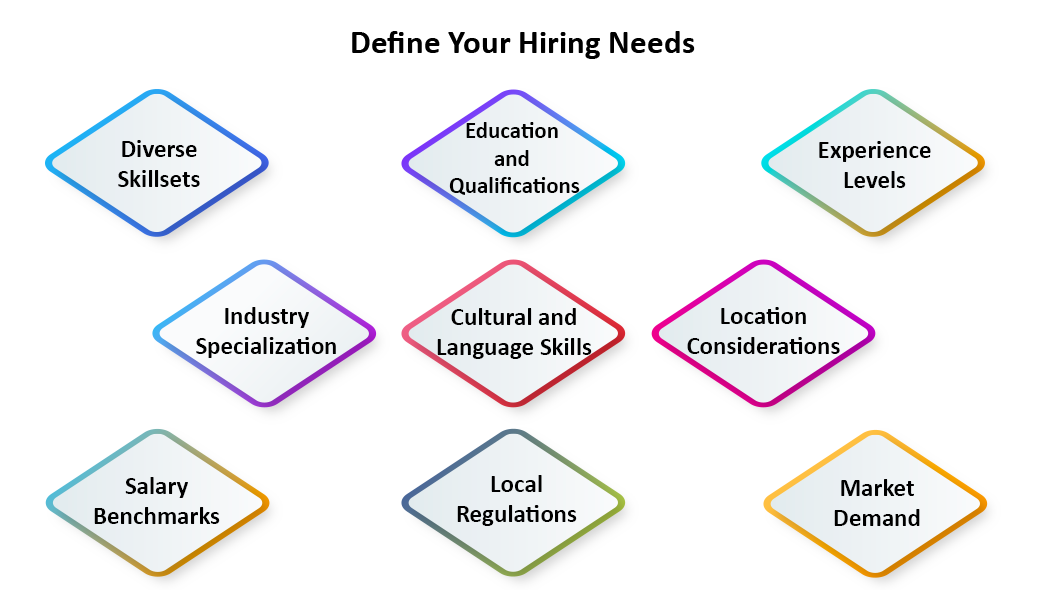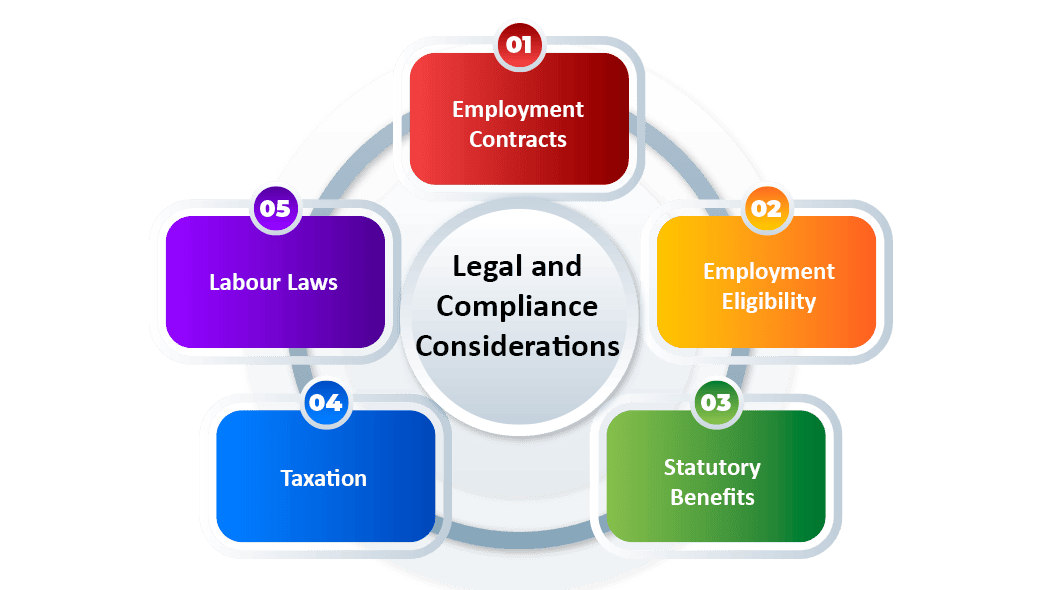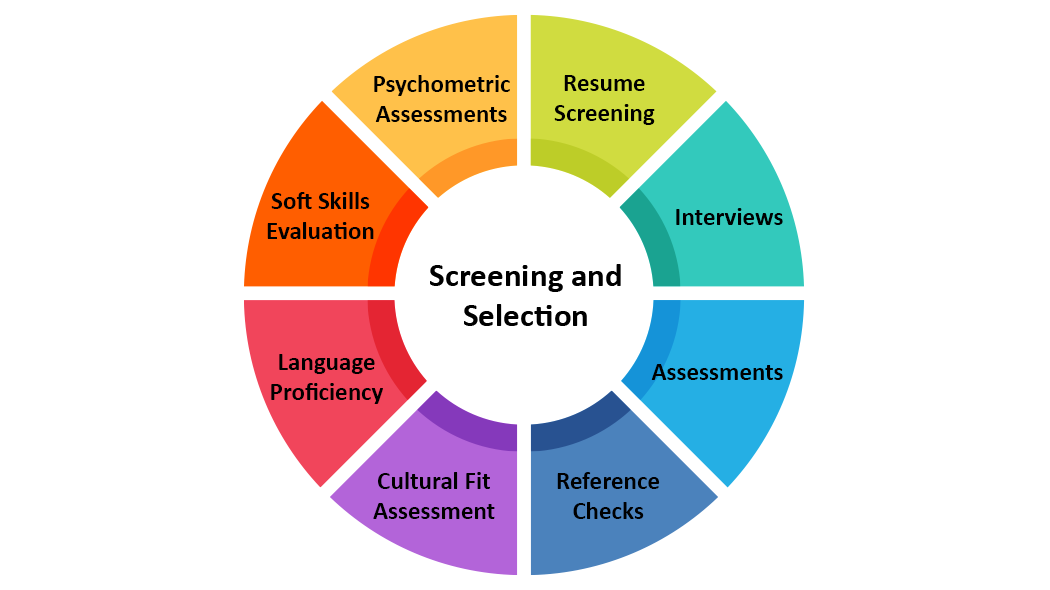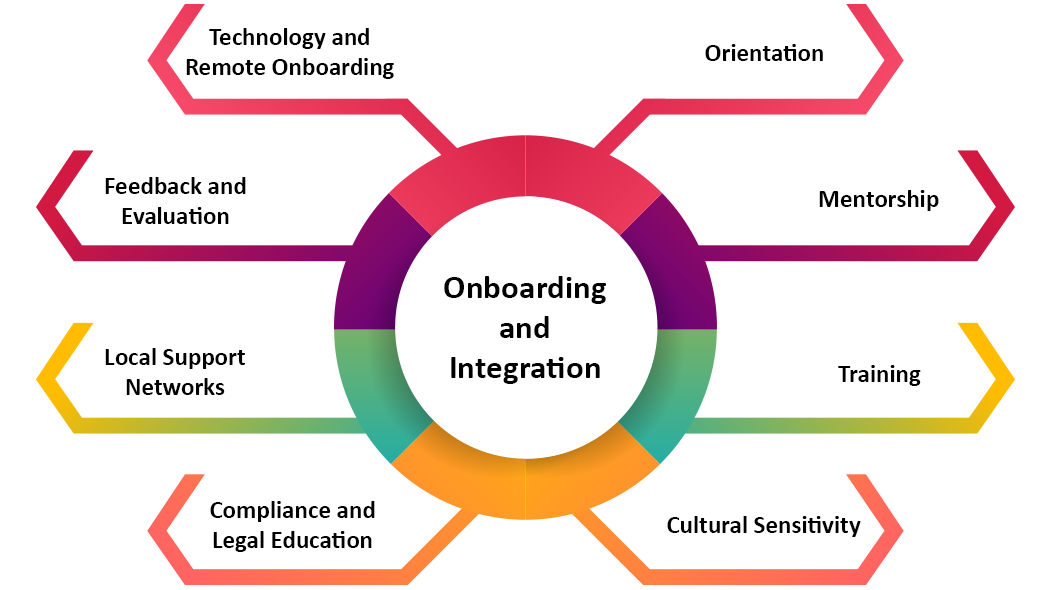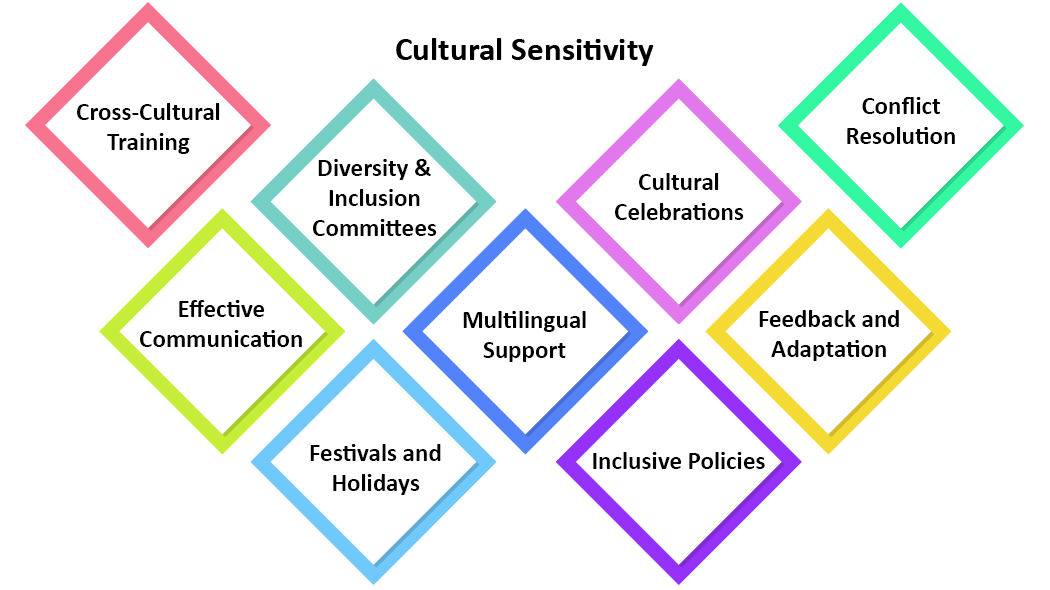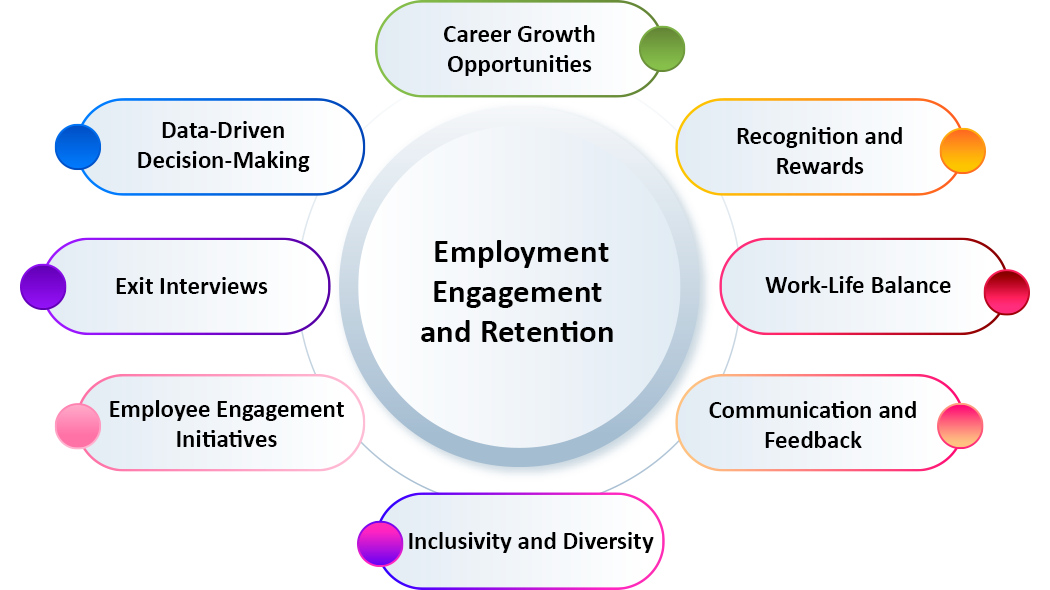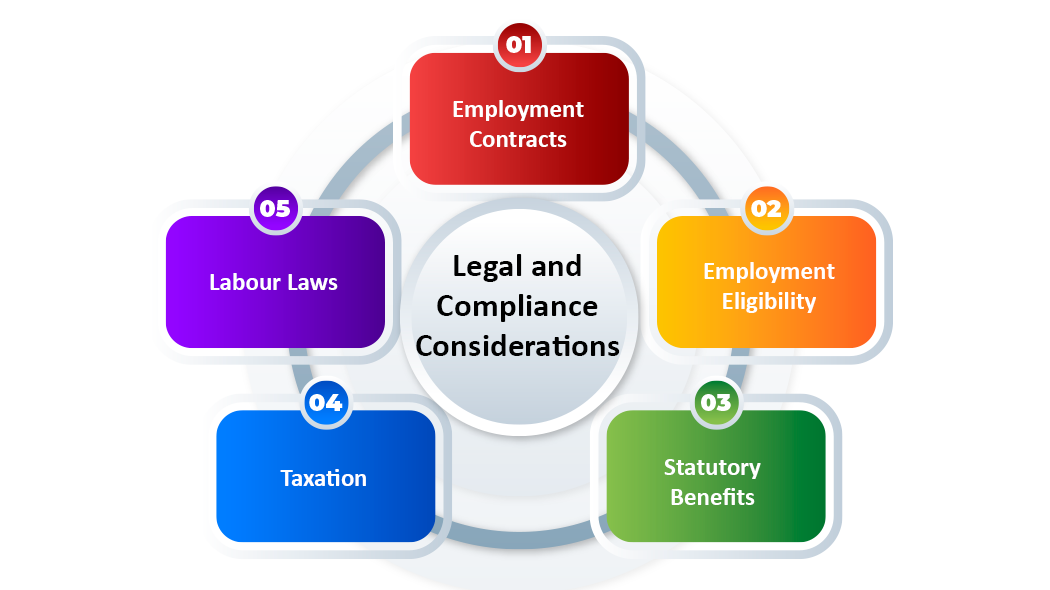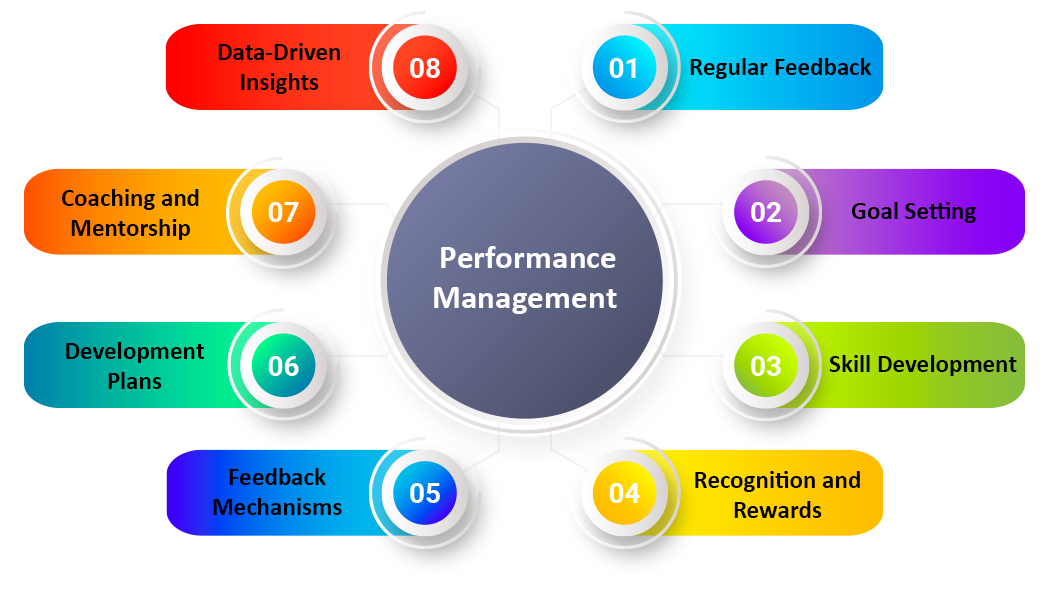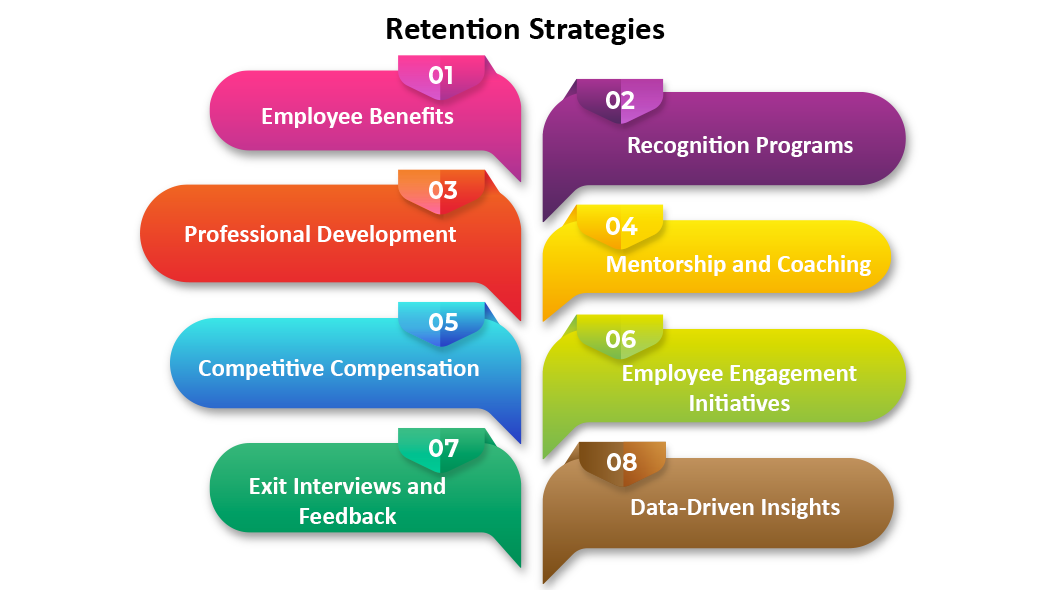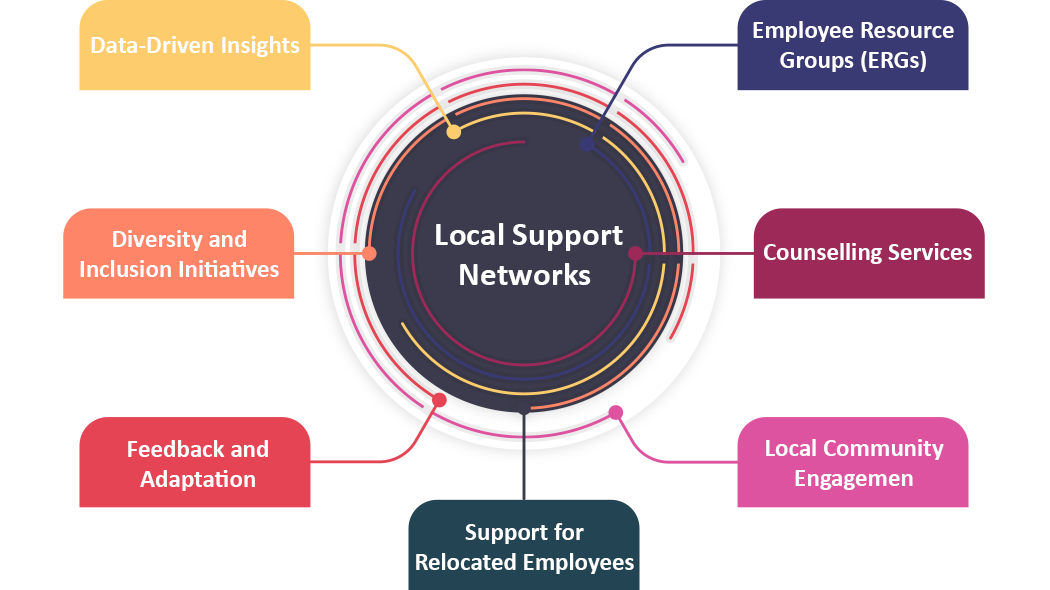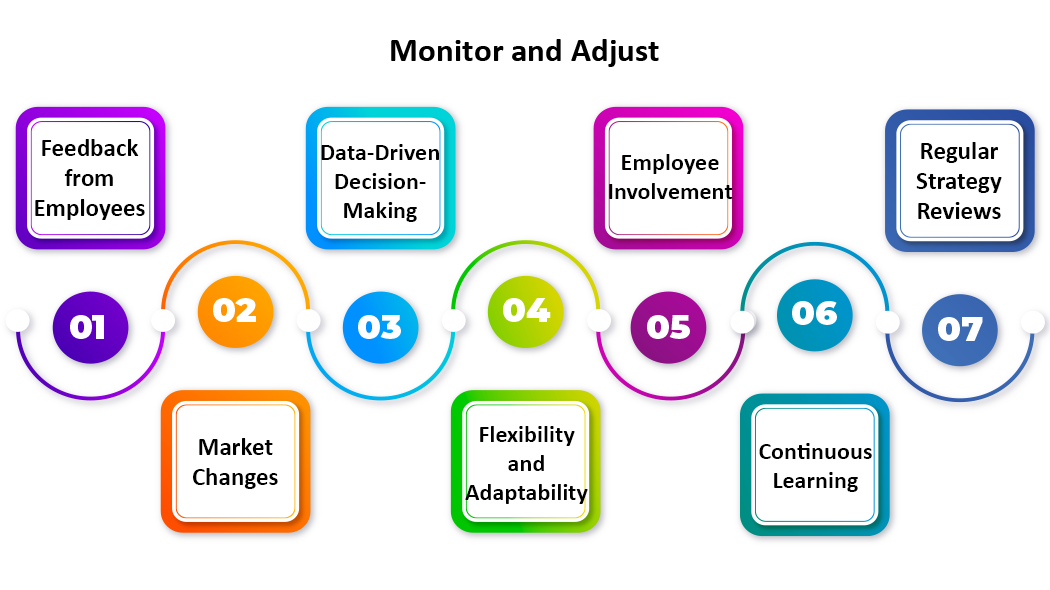In a rapidly evolving global marketplace, hiring the right talent is crucial for the success and growth of any organization. India, with its vast pool of skilled professionals and diverse talent, has become a popular destination for international companies looking to expand their workforce. However, navigating the Indian job market can be complex due to its unique cultural, legal, and business nuances. In this comprehensive guide, we’ll walk you through the essential steps and considerations for hiring employees in India.
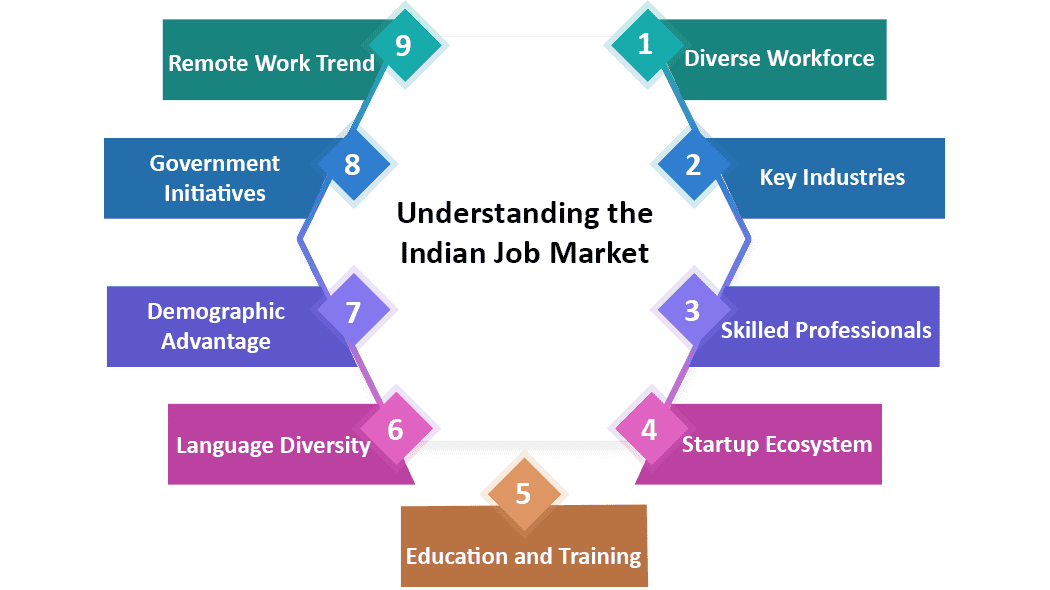
Understanding the Indian Job Market:
Before diving into the hiring process, it’s crucial to have a solid understanding of the Indian job market. India is known for its large and diverse workforce, spanning various industries, including IT, healthcare, engineering, and more. The country also boasts a burgeoning startup ecosystem and a growing pool of highly skilled professionals.
Indian Job Market consists of:
- Diverse Workforce: India has a population of over 1.3 billion people, with a significant percentage in the working age group (40% labour force participation rate)
- Key Industries: India’s economy includes industries such as IT, software services, healthcare, pharmaceuticals, engineering, manufacturing, finance, and education. The IT and software services sector has experienced significant growth, making India a global IT outsourcing hub.
- Skilled Professionals: India produces highly skilled professionals in fields like engineering, computer science, and medicine. In 2020, it produced approximately 1.5 million engineers and 79,000 doctors.
- Startup Ecosystem: India has a thriving startup ecosystem with over 50,000 startups, particularly in cities like Bangalore, Mumbai, Delhi, and Hyderabad.
- Education and Training: India has prestigious institutions like IITs and IIMs and had over 39,000 colleges and 993 universities in 2023.
- Language Diversity: India is linguistically diverse with English widely used for business communication.
- Demographic Advantage: India has a young population, with a median age of around 28 years.
- Government Initiatives: The Indian government introduced initiatives like ‘Make in India’ and ‘Skill India’ to boost employment.
- Remote Work Trend: The COVID-19 pandemic accelerated the adoption of remote work in India, providing flexibility for international employers.
Define Your Hiring Needs:
The first step in hiring employees in India is defining your hiring needs. Identify the roles and positions you need to fill and outline the specific skills, qualifications, and experience required for each role. Understanding your hiring needs will help you create more targeted job descriptions and streamline the recruitment process.
- Diverse Skillsets: India’s workforce offers diverse skills, including software developers, engineers, data analysts, customer service representatives, and more, depending on your industry.
- Education and Qualifications: India produces many graduates, so specify educational qualifications required for your roles.
- Experience Levels: Clearly outline the years of experience needed, considering both fresh graduates and experienced professionals.
- Industry Specialization: Specify industry-specific knowledge or certifications required.
- Cultural and Language Skills: Depending on your needs, candidates may need fluency in specific languages, especially English.
- Location Considerations: Define the geographic location for job openings based on talent availability and specialization.
- Salary Benchmarks: Research industry-specific salary benchmarks in India to offer competitive compensation packages.
- Local Regulations: Be aware of regional labour laws and incentives affecting hiring needs.
- Market Demand: Monitor job market demand for specific skills, like data science and artificial intelligence.
Legal and Compliance Considerations:
Hiring employees in India involves navigating a complex web of labour laws and regulations. To ensure a smooth and compliant hiring process, it’s essential to pay close attention to the following legal aspects:
- Employment Contracts: Draft clear and comprehensive contracts that outline terms and conditions, including salary, benefits, working hours, and notice periods. These contracts are governed by the Indian Contract Act, 1872.
- Employment Eligibility: Verify candidates’ eligibility to work in India, ensuring they have the required work permits and visas based on the nature of employment (e.g., employment, business, or dependent visas).
- Statutory Benefits: Be aware of and adhere to statutory benefits and contributions, including Provident Fund (PF), Gratuity, and Employee State Insurance (ESI) contributions.
- Taxation: Deduct income tax at source (TDS) from employees’ salaries and remit it to the government. Familiarize yourself with India’s comprehensive tax system and Double Taxation Avoidance Agreements (DTAA) for expatriate employees.
- Labour Laws: Comply with India’s numerous labour laws governing aspects like wages, working conditions, and industrial disputes. Key laws include the Industrial Disputes Act, 1947, Minimum Wages Act, 1948, and Equal Remuneration Act, 1976.
Consulting legal experts or experienced HR consultants in Indian labour laws is advisable to ensure compliance, assist with contract drafting, and avoid legal disputes, financial penalties, and reputational damage. Legal diligence is integral to hiring in India.
Job Advertising and Recruitment:
In India’s competitive job market, effective job advertising and recruitment strategies are crucial for attracting top talent.
Here are some proven methods to consider to effectively attract top talent in India’s competitive job market, consider these recruitment pointers:
- Job Portals: Utilize popular online job portals like Naukri.com, MonsterIndia.com, Shine.com, TimesJobs.com, and Indeed.co.in for job posting and candidate search.
- Recruitment Agencies: Collaborate with reputable Indian recruitment agencies to source candidates for specialized roles.
- Campus Recruitment: Partner with Indian universities, including prestigious institutions like IITs, IIMs, and NITs, for access to fresh graduates.
- Social Media: Leverage platforms like LinkedIn, Facebook, and Twitter for job advertising and employer branding, particularly LinkedIn with its large user base.
- Employee Referrals: Encourage current employees to refer qualified candidates, often incentivized with referral bonuses.
- Job Fairs and Events: Participate in job fairs and industry-specific events organized by universities and associations.
- Online Communities: Engage with industry-specific online communities and forums, such as GitHub and Stack Overflow, to source specialized talent.
- Company Website: Maintain a dedicated careers page on your company’s website to showcase culture, values, and job openings.
- Diversity & Inclusion: Promote diversity and inclusion in recruitment efforts to attract a broader talent pool.
Incorporating a mix of these recruitment strategies tailored to your specific hiring needs can significantly increase your chances of finding the right talent in India’s competitive job market. Keep in mind that the effectiveness of these strategies may evolve over time, so it’s essential to stay updated with the latest trends and platforms in the Indian job market.
Screening and Selection:
A robust screening and selection process is essential to identify the right candidates who not only possess the required qualifications but also align with your organization’s culture and values.
- Resume Screening: Review detailed resumes or CVs, as Indian job seekers consider resumes crucial.
- Interviews: Use in-person and video interviews, which saw a 65% increase in usage in 2020.
- Assessments: Administer skills and aptitude tests, especially for technical roles. Tools like HackerRank and Codility are common for technical assessments.
- Reference Checks: Verify employment history and credentials through reference checks, a standard practice in India.
- Cultural Fit Assessment: Assess alignment with your organization’s values and work culture, considering India’s regional and cultural variations.
- Language Proficiency: Evaluate language skills, especially in English, for effective communication in a diverse workplace.
- Soft Skills Evaluation: Assess communication, teamwork, adaptability, and problem-solving skills highly valued in the Indian job market.
- Psychometric Assessments: Use psychometric assessments for roles requiring specific personality traits like leadership or creativity.
It’s important to note that the screening and selection process may vary based on the industry, role, and organization’s specific requirements. Tailoring your process to align with your unique needs can lead to more successful hires.
Salary and Compensation:
Offering competitive salary packages and benefits is vital for attracting and retaining top talent in India’s competitive job market.
To offer competitive salary packages and benefits in India’s competitive job market, consider these pointers:
- Market Research: Conduct market research using sources like PayScale, Glassdoor, and LinkedIn Salary Insights for industry-specific salary benchmarks.
- Currency Conversion: Account for currency conversion rates when hiring expatriate employees to ensure competitive salaries.
- Performance Bonuses: Include performance-based incentives and annual bonuses tied to key performance indicators (KPIs).
- Benefits and Perks: Offer a comprehensive benefits package, including health insurance, retirement plans (e.g., Employee Provident Fund), paid time off, and flexible work arrangements.
- Variable Pay: Consider variable pay components like sales commissions for performance-driven roles.
- Cost of Living: Adjust salaries based on the cost of living in different Indian cities, such as Mumbai and Bangalore, to maintain a comfortable lifestyle.
- Salary Reviews: Communicate a clear process for annual salary reviews and increments based on performance, inflation rates, and market conditions.
- Salary Negotiation: Be prepared for salary negotiations during the hiring process and be flexible within budgetary constraints.
- Legal Compliance: Ensure compensation packages comply with Indian labour laws, including minimum wage laws, statutory benefits, and taxation requirements.
By conducting market research, factoring in currency conversion for expatriates, and offering competitive salary packages with performance-based incentives, you can position your organization as an attractive employer in India’s dynamic job market. Staying informed about industry trends and candidate expectations is essential for developing compensation packages that resonate with top talent.
Onboarding and Integration:
A successful onboarding process is critical for ensuring that new employees in India integrate seamlessly into your organization, understand its culture, and become productive members of the team. For a successful onboarding process in India:
- Orientation: Conduct comprehensive orientation sessions to introduce new hires to company culture, policies, and procedures. Effective onboarding can improve employee retention by 82%.
- Mentorship: Assign mentors or buddies to help new employees acclimate, understand dynamics, and build relationships.
- Training: Offer training and development programs as continuous learning is highly valued in India, impacting talent retention.
- Cultural Sensitivity: Include cultural awareness training to foster understanding and respect for diverse backgrounds and traditions.
- Compliance and Legal Education: Educate employees on Indian labor laws, tax regulations, and workplace safety guidelines.
- Local Support Networks: Connect employees with local support networks, especially expatriates, for assistance with settling in and navigating the culture.
- Feedback and Evaluation: Collect feedback from new hires and conduct evaluations to improve the onboarding process.
- Technology and Remote Onboarding: Utilize technology, including virtual onboarding platforms, for seamless onboarding, considering the shift towards remote work.
An effective onboarding process in India not only aids in employee retention but also contributes to employee satisfaction, productivity, and engagement. As the Indian job market evolves, companies that invest in structured onboarding and integration programs are better positioned to attract and retain top talent. These programs are not just one-time events but ongoing processes that support employee growth and development throughout their tenure with the organization.
Cultural Sensitivity:
Understanding and Respecting Cultural Diversity in India: India is renowned for its rich cultural tapestry, characterized by diverse languages, traditions, festivals, and customs. Navigating this diversity is crucial for creating a harmonious work environment and fostering inclusivity within your organization.
Here are some key considerations:
- Cross-Cultural Training: Provide cultural sensitivity training for both local and expatriate staff to promote understanding and reduce misunderstandings.
- Effective Communication: Emphasize clear and inclusive communication in a multicultural workplace, addressing language barriers sensitively.
- Festivals and Holidays: Recognize and respect India’s diverse festivals and holidays. Accommodate local holidays in your leave policy and offer flexibility during festival seasons.
- Diversity & Inclusion Committees: Establish diversity and inclusion committees or ERGs to promote cultural awareness and provide a platform for sharing perspectives.
- Multilingual Support: Offer multilingual support, such as language training or materials in local languages.
- Inclusive Policies: Review HR policies to avoid unintentional discrimination and accommodate cultural differences.
- Cultural Celebrations: Encourage employees to share their traditions and cuisines during cultural festivals to foster unity.
- Conflict Resolution: Establish conflict resolution mechanisms that consider cultural differences and provide mediation if needed.
- Feedback and Adaptation: Continuously seek employee feedback to adapt and improve cultural diversity initiatives as needs evolve.
Promoting cultural understanding and inclusivity is essential for a harmonious work environment in India’s diverse cultural landscape. By understanding and respecting the cultural diversity in India, your organization can create an inclusive and harmonious work environment where employees feel valued and appreciated, ultimately contributing to their job satisfaction and productivity.
Employment Engagement and Retention:
India’s job market is characterized by high demand for skilled professionals, making employee engagement and retention critical for organizations.
To retain top talent in India, consider these strategies:
- Career Growth Opportunities:
- Offer professional development through training, workshops, certifications, and mentorship.
- Establish clear career paths with opportunities for advancement based on performance.
- Recognition and Rewards:
- Implement employee recognition programs that acknowledge contributions.
- Ensure competitive compensation packages, regularly reviewing and adjusting salaries.
- Work-Life Balance:
- Provide flexible work arrangements, including remote work and flexible hours.
- Promote wellness with programs, health insurance, and mental health support.
- Communication and Feedback:
- Maintain open and transparent communication channels.
- Conduct regular performance reviews and feedback sessions.
- Inclusivity and Diversity:
- Foster an inclusive culture where diversity is celebrated.
- Offer equal opportunities for career growth and development.
- Employee Engagement Initiatives:
- Organize team-building activities to build cohesive teams.
- Engage in corporate social responsibility (CSR) initiatives.
- Exit Interviews:
- Conduct exit-interviews to gather insights from departing employees.
- Data-Driven Decision-Making:
- Utilize employee engagement surveys and data analytics to monitor and improve retention.
In India’s competitive job market, organizations that prioritize employee engagement, growth, and well-being are more likely to attract and retain top talent. Creating a positive work environment where employees feel valued, recognized, and supported can lead to higher job satisfaction and long-term commitment to your organization.
Legal and Taxation Compliance:
Navigating India’s intricate legal and taxation landscape is essential for businesses operating in the country. Ensuring compliance with labour and tax laws is not only a legal obligation but also vital for maintaining a positive reputation and avoiding costly penalties.
To navigate India’s legal and taxation landscape:
- Payroll and Tax Deductions:
- Ensure accurate and timely payroll processing using reliable software or services.
- Deduct income tax at source (TDS) in accordance with Indian tax laws.
- Statutory Reporting:
- Comply with Provident Fund (PF) and Employee State Insurance (ESI) regulations.
- Deduct and deposit TDS and file TDS returns as required.
- Labour Laws and Employment Contracts:
- Stay updated on changing labour laws in India.
- Draft clear and legally sound employment contracts compliant with Indian Contract Act, 1872.
- Legal Consultation:
- Engage legal experts or labour law consultants for guidance on compliance matters.
- Establish clear mechanisms for resolving employee disputes or grievances.
- Audit and Documentation:
- Conduct regular internal audits to identify and rectify compliance issues.
- Maintain comprehensive records of employee contracts, payroll, tax deductions, and compliance reports.
- Government Portals and Updates:
- Utilize government portals for e-filing and compliance reporting.
- Stay informed about legislative changes through official government websites and consult legal professionals for up-to-date compliance.
Navigating India’s legal and taxation requirements is essential for business operations and reputation management. Compliance with Indian labour and tax laws is not only a legal obligation but also a strategic imperative for organizations operating in the country. By prioritizing compliance, you mitigate risks, protect your organization’s reputation, and ensure a smooth and legally sound employment environment.
Performance Management:
A well-structured performance management system is vital for assessing and guiding employees’ progress, aligning their efforts with organizational goals, and fostering professional growth. In India’s competitive job market, effective performance management can contribute to higher employee engagement and retention.
Key considerations for performance management of Indian employees:
- Regular Feedback:
- Provide continuous feedback to enhance job performance.
- Conduct fair and transparent performance appraisals regularly.
- Goal Setting:
- Set clear and SMART performance goals aligned with organizational objectives.
- Skill Development:
- Offer training and development programs to bridge skill gaps.
- Discuss career aspirations and provide a clear path for advancement.
- Recognition and Rewards:
- Implement performance-based rewards and peer recognition programs.
- Feedback Mechanisms:
- Consider 360-degree feedback and employee surveys.
- Development Plans:
- Create individual development plans (IDPs) and regularly review them.
- Coaching and Mentorship:
- Provide coaching, mentoring, and leadership development opportunities.
- Data-Driven Insights:
- Utilize data analytics for insights into employee performance trends.
Effective performance management enhances individual and organizational growth and competitiveness in India’s job market.
Retention Strategies:
In India’s dynamic job market, retaining top talent is crucial for organizational stability and growth. Strategies to retain valuable employees in India:
- Employee Benefits:
- Offer comprehensive health insurance.
- Provide flexible working arrangements.
- Implement wellness programs.
- Recognition Programs:
- Regularly acknowledge and recognize exceptional employees.
- Encourage peer-to-peer recognition.
- Professional Development:
- Provide ongoing training and skill enhancement opportunities.
- Define clear career paths.
- Mentorship and Coaching:
- Establish mentorship programs.
- Invest in leadership development.
- Competitive Compensation:
- Ensure market-competitive salaries and benefits.
- Include performance-based incentives.
- Employee Engagement Initiatives:
- Organize team-building activities.
- Involve employees in corporate social responsibility initiatives.
- Exit Interviews and Feedback:
- Conduct exit interviews for insights.
- Seek regular feedback from current employees.
- Data-Driven Insights:
- Utilize data analytics to monitor engagement and retention trends.
Incorporating these retention strategies can help organizations in India attract and retain top talent in a competitive job market. A combination of attractive benefits, recognition, professional development opportunities, and a supportive work culture can significantly contribute to employee satisfaction and long-term commitment.
Local Support Networks:
Helping your employees integrate into the local community is not only beneficial for their well-being but also enhances their overall job satisfaction and performance.
In India, where cultural diversity and regional differences are significant & These Strategies can help employees integrate into the local community in India:
- Employee Resource Groups (ERGs):
- Create cultural affinity groups.
- Organize networking events and social gatherings.
- Counselling Services:
- Offer mental health support and Employee Assistance Programs (EAPs).
- Local Community Engagement:
- Encourage community outreach and volunteering.
- Provide language and cultural training.
- Support for Relocated Employees:
- Offer comprehensive relocation assistance.
- Provide local orientation sessions.
- Feedback and Adaptation:
- Establish feedback channels and act on employee input.
- Diversity and Inclusion Initiatives:
- Promote an inclusive organizational culture.
- Data-Driven Insights:
- Conduct regular employee surveys to tailor support services.
Implementing these strategies enhances employees’ well-being and job satisfaction while supporting their integration into India’s diverse communities. Establishing local support networks and resources in India can enhance employee well-being, engagement, and integration into the local community. By fostering a sense of belonging and addressing the unique challenges employees may face, organizations can contribute to higher job satisfaction and retention.
Monitor and Adjust:
Adapting to the ever-changing landscape of the Indian job market is essential for organizations aiming to remain competitive and retain top talent. Continuous evaluation and adjustment of your recruitment and retention strategies are key to success. Key strategies for adapting to the evolving Indian job market:
- Feedback from Employees:
- Conduct regular surveys and exit interviews to gather feedback.
- Market Changes:
- Stay updated on job market trends, salary benchmarks, and changing workforce dynamics.
- Data-Driven Decision-Making:
- Utilize analytics and benchmarking to measure strategy effectiveness.
- Flexibility and Adaptability:
- Be agile and open to experimentation.
- Employee Involvement:
- Involve employees in shaping strategies.
- Continuous Learning:
- Invest in HR team development.
- Regular Strategy Reviews:
- Schedule periodic strategy reviews with key stakeholders.
These strategies promote competitiveness and help organizations retain top talent in India’s dynamic job market. In conclusion, venturing into the Indian job market is an endeavour filled with opportunities and challenges. India’s diverse and skilled workforce, coupled with its thriving startup ecosystem, offers immense potential for organizations seeking growth and innovation. However, success in this dynamic landscape hinges on a comprehensive understanding of the legal, cultural, and business intricacies that define the Indian employment environment. Navigating these complexities with care and diligence, along with a commitment to continuous learning and adaptation, will empower organizations to build not just a workforce but a resilient and motivated team that propels them towards sustained success in India.
As organizations embark on their recruitment and retention journeys in India, they must remember that fostering a culture of compliance, diversity, and inclusivity is essential. By providing employees with the support and opportunities they need to thrive, and by staying attuned to market trends and employee feedback, organizations can unlock the full potential of the Indian workforce and forge lasting relationships that benefit both employees and employers alike. In this rapidly evolving employment landscape, the key to long-term success is not just finding talent but nurturing it, embracing change, and remaining adaptable to the evolving dynamics of the Indian job market.

